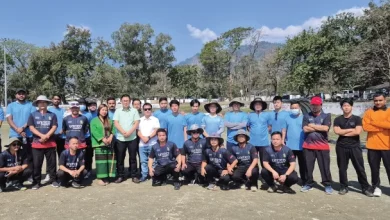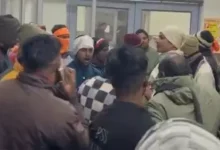Karnataka hijab politics again in headlines, Congress will lift ban, BJP warns of struggle

Bengaluru: Karnataka’s hijab policy, which threatens to divide the student community on communal lines and worsened the law and order situation in the state during the BJP government last year, has once again come to the fore. Karnataka Minister Siddaramaiah’s announcement that he will lift the ban on hijab for students and university students (classes 11 and 12), has triggered a huge debate on the topic. Opposition BJP has hinted at conflict in the coming days. Expert educationists claim that a large number of Muslim girls, who were previously denied the possibility of attending schools and universities, will now be able to leave their homes and continue their studies. Political analysts said that CM Siddaramaiah’s announcement is a political measure to consolidate the votes of Muslims. This is also to counter the rising wave of Hindutva in the context of the inauguration of Shri Ram Temple in Ayodhya. He also pointed out that the announcement is also aimed at countering Prime Minister Modi’s tendency to overreach and curb the rise of “muscle” nationalism ahead of the 2024 Lok Sabha elections. Former CM B.S. Yediyurappa said that although the BJP will not organize protests against the lifting of the ban on hijab, people will lecture the Congress in the upcoming parliamentary elections. BJP MLA Basanagouda Patil Yatnal and former secretary national C.T. Ravi said Hindu students now demand that they use azafran colored chalk and tilak. BJP’s chief voice actor Karunakar Kasale, who spoke to IANS, said that, after CM Siddaramaiah took power, he is returning to the policy of appeasement in Karnataka. It is dividing communities. “There are sequoias in the state. No minister talks about this. People have no answer. We are doing politics and distorting things”, he said. It is a practice to sow the seeds of poison and hatred in the minds of students. The matter is in the Supreme Court and CM Siddaramaiah’s statement is tantamount to an insult to the tribunal. There will be a strong protest and as a result CM Siddaramaiah may have to resign”, said Karunakar Kasale. Political analyst Channabasappa Rudrappa told IANS that the statement on hijab was related to strengthening the vote bank. “Ram temple fever has started in the country. CM Siddaramaiah is consolidating Ahinda’s votes. Within a week, a conference of backward classes like Ediga, Madiwala, Ganiga, Bhovi and Dalit will be organized. “With the proposal of AICC President Mallikarjun Kharge as the Prime Ministerial candidate from the Bharat Bloc, the first plan to consolidate Muslim votes by addressing the interests of Dalits and the issue of hijab was passed. CM Siddaramaiah is leading the charge against Prime Minister Modi in the state and countering the strong nationalism and old Hindutva that is gaining ground in the state ahead of the Lok Sabha elections”, Rudrappa said. Educators for Development vice-president and social activist Niranjan Aaradhya told IANS, “Removing the ban on hijab is a welcome decision from CM Siddaramaiah. Any decision that takes away the fundamental rights of students in schools and universities will impact the education of children. “Due to the ban on hijab, many students lost their right to education. Many people did not attend the first PUC (Class 11) and skipped the second PUC (Class 12). Studies have also been conducted regarding this. The study was conducted by the Popular Union for Civil Liberties (PUCL). The girls have declared that their parents are no longer interested in sending them to school after the hijab ban”, she said. “Additionally, the Constitution of India talks about various values such as multiculturalism and multilingualism. When there is a provision to follow all the traditions then it is wrong to lump them in the name of religion. All the mistakes made earlier in this state are being corrected one after the other. Education should be administered with discipline and in a manner that does not affect the dignity of the child”, explained Niranjan Aaradhya. “The dignity of the child constitutes his beliefs, his customs. This is part of protecting dignity. International laws recognize them and the Constitution of India provides for it. Although legal provisions exist, these violate political penalties. “I hope that
















